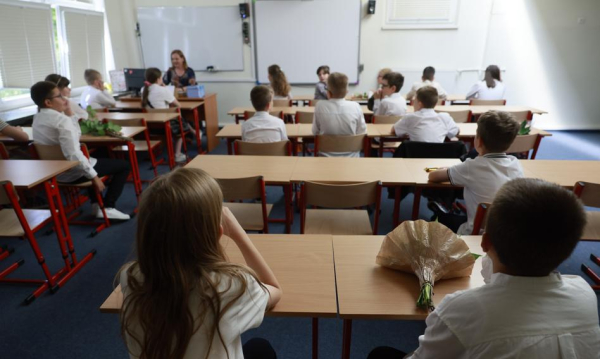Just weeks before the start of the 2025/2026 school year, the job posting databases of school boards and city halls list over 20,000 teaching vacancies. Mathematicians, chemists, physicists, and vocational teachers are most in short supply. Reasons include unsatisfactory working conditions and salaries.

There are three weeks left until the start of the new school year, yet in many schools, school principals are making desperate attempts to provide students with full teaching staff and, consequently, appropriate learning conditions.
Staff shortages are getting bigger
According to Urszula Woźniak, vice-president of the Main Board of the Polish Teachers' Union, in mid-July Poland was short of 20,000 teachers, including 1,700 kindergarten teachers, 2,000 specialist teachers, as well as so-called “subject teachers,” especially mathematicians, physicists, chemists, and vocational teachers.
Advertisement See also: Take part in our stock market multi-thlon! Disciplines: sprint for stocks, dive into ETFs, and push your wallet for the prize.
“The number of vacancies will likely increase this month, as it happens every year,” Urszula Woźniak tells Bankier.pl. “Of course, the distribution is uneven. There are municipalities where the problem doesn't exist, but in large cities, the shortages are enormous.”
According to the ZNP representative, the reasons for the shortage of teachers are primarily low salaries and very difficult working conditions, which in turn affects the quality of teaching.

“Demanding parents, a lack of respect, and the impoverishment of teachers, not to mention the prestige of the profession, also play a huge role,” explains Urszula Woźniak. “We already have a generation gap in education. There are practically no young people left in this profession, and the system is being saved by retired teachers. Unfortunately, there is also no recruitment for teacher training programs, and graduates don't take up jobs in schools or preschools.”
Retired teachers and students in reserve
The staffing problem in schools is visible throughout the country.
“There's a shortage of teachers both in our city and across Poland. It's a systemic problem,” Monika Dubec from Wrocław City Hall tells Bankier.pl. “In recent years, many teachers have retired or decided to change careers. Unfortunately, many people resign, among other reasons. Despite these difficulties, school principals are doing everything they can to have a full staff by September. They're recruiting throughout the summer holidays and employing retired teachers and students with the school board's consent. This makes Wrocław an example of a city where it wasn't necessary to close classes or preschool groups. However, this situation means that, as in previous years, many teachers will be working across multiple schools and overtime.”
Necessary overtime
It turns out that principals allocate vacancies as overtime hours to employed teachers at the beginning of the year – in accordance with regulations, up to one-half of their full-time position. However, in the event of a shortage of vocational teachers, the amendment to the Teachers' Charter allows for the allocation of a greater number of overtime hours.
“However, these are ad hoc measures. An overworked teacher can't perform at their highest level, and when they get sick, there's no one to replace them,” explains Urszula Woźniak. “Society has stereotypes in this area that are difficult to change. They believe teachers work 18-hour days and have a lot of free time. In reality, in large cities, they work in very diverse and large classes, with as many as 32 students. In mainstream schools and preschools, there's no limit on the number of children with a diagnosis of special education need. Besides these, there are also those with reports from psychological and pedagogical counseling centers, refugee children from various countries, and exceptionally gifted children. Most of them require individualized interventions. However, this is difficult to achieve when the group is so large and the students require different interventions. Simply surviving such a lesson is already a success. Parents, however, naturally complain that their children aren't receiving special treatment.”
Overload and lack of respect are disturbing
Teacher overload is becoming increasingly apparent. One teacher often performs duties that should be shared by at least two people.
“Numerous overtime hours are our daily reality. We have to take on numerous substitutes, even for absent colleagues,” Renata Wójcik, an English teacher at a Warsaw primary school, tells Bankier.pl. “Meanwhile, our earnings aren't great at all. That's why I also work at a private language school. Not to mention that our work is becoming increasingly difficult, partly due to the changing mentality of students and their parents. We are increasingly treated with disrespect, and even spoken to in vulgar terms, which makes our work harder.”
We need to stop thinking that teachers will always manage
According to the Polish Teachers' Union, in order to improve the situation in education, it is necessary to dramatically improve teachers' working conditions, reduce the number of classes, set limits for children with special educational needs and pay teachers decently .
“Currently, in Warsaw, a support worker with a primary education earns more than a teacher, and the education and responsibility are incomparable. Teacher training also needs to change and we need to stop thinking that they'll always manage,” adds Urszula Woźniak.
Will teachers take to the streets?
Meanwhile, a protest alert has been in place since June 24th, announced by the Main Board of the Polish Teachers' Union. As part of this initiative, an information campaign is underway regarding the growing problems in the education system and the ZNP's demands addressed to the government, the Minister of Education, and the Minister of Science and Higher Education. Although the Sejm (lower house of parliament) passed an amendment to the Teachers' Charter, the ZNP is primarily demanding that teachers' salaries be linked to the national average and a 10% salary increase. If these demands are not met, a demonstration by education workers will take place in Warsaw on September 1st, 2025.






